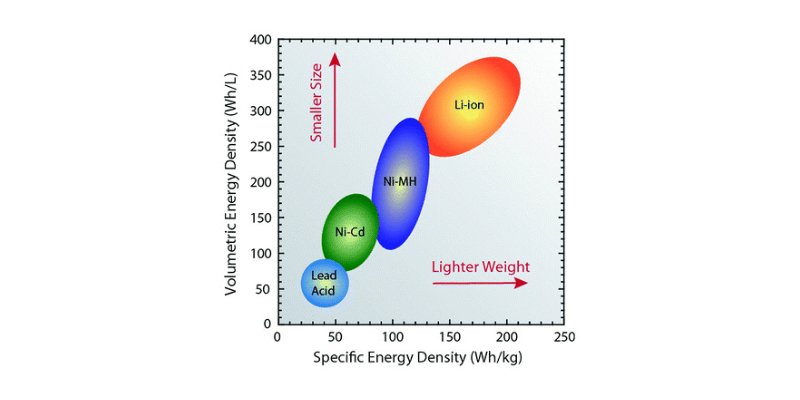Energy density is crucial for battery storage performance. It affects capacity, versatility, and efficiency. Understanding energy density enables unlocking battery storage’s potential for energy management, self-sufficiency, and sustainability.
What Is Energy Density?
Energy density refers to the amount of energy stored relative to its weight or size.
Specific energy density compares energy to weight (Wh/kg), while volumetric energy density compares energy to volume (Wh/L).

Why Does Battery Energy Density Matter?
Battery energy density matters for several key reasons:
- Efficiency: Higher density means more energy stored in less space or weight, improving portability.
- Range and Endurance: Denser batteries allow longer vehicle range and operation times.
- Space Constraints: Denser batteries maximize energy storage in limited spaces.
- Cost Effectiveness: Higher density reduces the number of batteries needed to achieve the same capacity.
- Environmental Impact: Fewer materials are required to store the same energy with higher density.
Which Type of Battery Currently Has the Highest Energy Density?
Batteries have varying energy densities based on their internal chemistry:
- Lead acid: 30-50 Wh/kg
- Nickel-cadmium: 45-80 Wh/kg
- Nickel-metal hydride: 60-120 Wh/kg
- Lithium-ion: 50-260 Wh/kg

We can see there is no doubt that lithium-ion batteries offer the highest energy density. Their energy density ranges from 50-260 Wh/kg, exceeding lead-acid batteries’ 30-50 Wh/kg. Advancements in lithium-ion battery chemistry, such as using different anode and cathode materials, have allowed engineers to experiment with energy and power density.
What Are the Risks of High Energy Density?
The higher a battery’s energy density, the more energy it can release if something goes wrong.
Lithium-ion batteries contain volatile liquid electrolytes that can cause combustion, posing a fire hazard. Therefore, they need to be built with safety features. However, this limits how lightweight and compact these batteries can become.

Energy Density vs. Power Density in Batteries
Energy density and power density are similar battery metrics, but they differ in one key way.
Energy density measures watt-hours per kilogram, while power density measures watt output per kilogram.
Power density indicates how quickly energy can be delivered, while energy density shows how much energy a battery holds.
Conclusion
A battery’s energy density impacts its size, runtime, and safety. It is a key focus of battery innovation, making lithium-ion batteries popular. Maximizing energy density enables more compact, longer-lasting, and eco-friendly solutions, advancing technology and meeting energy needs. For questions on maximizing energy density, contact an expert at Holo Battery.
Related Articles:


